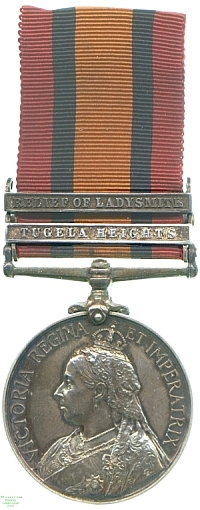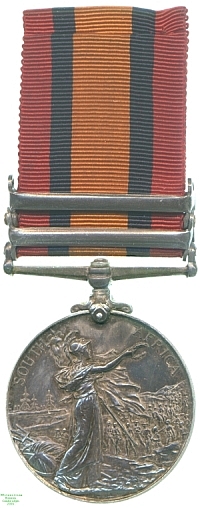
Obverse, a bust of Queen Victoria with veil

Reverse, Britannia in the foreground facing right holding a standard and waving a wreath over an army marching along the shore, with ships offshore in the background

Obverse, a bust of Queen Victoria with veil |

Reverse, Britannia in the foreground facing right holding a standard and waving a wreath over an army marching along the shore, with ships offshore in the background |
During the 1830s and 1840s several Dutch republics had been established outside the British Cape Colony in South Africa, among which were Transvaal and the Orange Free State, all now in modern South Africa. Transvaal was annexed briefly by the British but its independence re-established in the First Boer War.
In the 1880s however the discovery of vast gold reserves in Transvaal brought large numbers of foreign settlers, largely British, across the border, and an attempted coup at the instigation of Cecil Rhodes in 1895. Military escalation followed, negotiations failed and the two Boer republics, convinced that the British intended annexation, declared war in the Cape Colony in October 1899.
The immediate result was the siege of British troops in Ladysmith, Mafeking and Kimberley, while field forces attempting to come to their relief were defeated in several open battles by Boer contingents. Kimberley, the first town to be relieved, could open its gates only in mid-February; Mafeking, famously, had to hold out until May. A relief force sent to Ladysmith was roundly defeated by Louis Botha in January 1900 while attempting to cross the Tugela River at Colenso, and again at Val Krantz on 5 February. The town was finally relieved on 15 February, by which time a fuller Imperial offensive was driving the Boers back. Their resistance in the field was more or less quelled by May 1900, but their forces maintained a bitter and obdurate guerilla campaign in several areas of the two Republics until mid-1902, when a surrender was finally agreed.
This medal was awarded to Surgeon Captain W. Hall-Owen, of the Medical Staff Corps of the Victoria Militia. He was apparently attached to the forces that relieved Ladysmith, and also served during their actions reducing Boer forces in the surrounding Tugela area in the days thereafter. Lester Watson acquired his medal at some point before 1928.